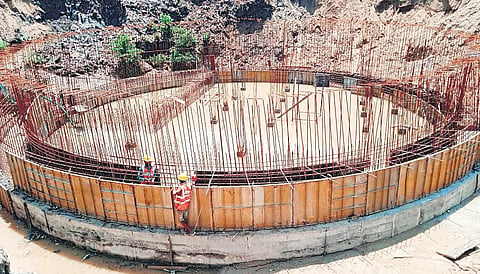

HYDERABAD: If things go according to plan, Hyderabad will become the only city in the country to have 100 per cent sewage treatment facility by the end of next year. Work on the 31 Sewage Treatment Plants (STPs) in Greater Hyderabad and its outskirts are on at a brisk pace and are expected to be completed by next summer. In fact, some of them are expected to be ready by the end of this year. Apart from treating the generated sewage, the new STPs would also help protect water bodies including lakes, tanks and ponds in the city.
"Am very proud of my@HMWSSBOnline team led by@MDHMWSSB Dana Kishore Garu & ED Satyanaryana Garu. With 100% sewage treatment in #Hyderabad by next summer, our capital city will be a shining example for other Indian cities to emulate," Municipal Administration Minister KT Rama Rao tweeted on Sunday. On implementation of 31 STPs, Hyderabad city will stand in the first position among all metropolitan cities in the country for the treatment of sewage.
To improve the infrastructure for the treatment of sewage generated in GHMC limits, the State government had in 2021 sanctioned Rs 3,866.21 crore to establish 31 STPs in the first phase. These STPs will have the capacity to treat 1,260 million litres per day (MLD) of sewage through the hybrid annuity model.
The project is being taken up in three packages -- package-1 covers eight STPs with 402.5 MLD capacity with an outlay of Rs 1,230.21 crore and will be implemented in the north of Musi (Uppal, Kapra, Makajgiri, Alwal circles); Package-II covers six STPs (480.5 MLD costing Rs 1,355.13 crore in the south of Musi (Rajendranagar and LB Nagar circles) and another 17 STPs (376.5 MLD, Rs 1,280.87 crore covering Hussainsagar catchment areas of Kukatpally, Quthbullapur, Serilingampally circles).
As per the Hybrid Annuity Model (HAM), the State government would contribute Rs 1,546.49 crore (40 percent) of the cost while the remaining amount would be mobilised by the contracting agencies who would also be responsible for maintaining the STPs for 15 years.
Sources told Express that scaling up of sewage treatment facilities was taken up on the directions of Chief Minister K. Chandrasekhar Rao to meet the sewage treatment needs for the next 10 years. Presently, the city generates about 1,650 MLD of sewage water every day, and this would increase by 300 MLD over the next 10 years, according to a study conducted by Shah Consultants.
The existing 25 STPs have the capacity to treat 772 MLD, or 46.78 per cent of the total sewage water generated. The remaining 53.22 per cent of sewerage is left untreated in the river Musi and various other water bodies.
Incidentally, apart from the STPs, the State government plans laying of lateral sewer mains, branch sewer mains, and trunk sewer mains for the collection of sewage and transport up to the STPs as part of its Comprehensive Sewerage Master Plan (CSMP).
According to Shah Consultants, the city and its surroundings would generate around 2,814 MLD of sewage by the year 2036 and this would go up to 3,715 MLD by 2051. The consultants recommended a total of 62 STPs (31 in GHMC limits and 31 more in ORR areas) to meet the sewage treatment requirements till 2051.